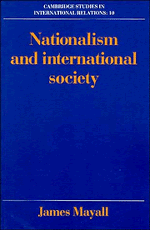Book contents
- Frontmatter
- Contents
- Acknowledgements
- Introduction
- 1 The search for the international system: the problem of theory
- 2 The society of states
- 3 Nationalism and the creation of states
- 4 Nationalism and the international order
- 5 Economic nationalism and the liberal world order
- 6 The new economic nationalism
- 7 Post-colonial nationalism
- 8 The third world and international society
- Conclusion
- Notes
- Index
2 - The society of states
Published online by Cambridge University Press: 05 July 2011
- Frontmatter
- Contents
- Acknowledgements
- Introduction
- 1 The search for the international system: the problem of theory
- 2 The society of states
- 3 Nationalism and the creation of states
- 4 Nationalism and the international order
- 5 Economic nationalism and the liberal world order
- 6 The new economic nationalism
- 7 Post-colonial nationalism
- 8 The third world and international society
- Conclusion
- Notes
- Index
Summary
The design of the society of states is extremely simple. The model is derived from the principles on which the seventeenth-century European peace treaties were based and from the assumptions, requirements and additions which were introduced by the conference diplomacy of the eighteenth and nineteenth centuries. The model rests firstly on an agreed legal settlement, and secondly, and more contentiously, on an institutionalised political dispensation.
THE TRADITIONAL MODEL
The legal settlement is based on the repudiation of the principle of hierarchy in inter-state relations, and consequently on an affirmation of the principle of the sovereign equality of states. The political dispensation, by contrast, involved the major powers in acknowledging to each other that, not withstanding the legal equality of all states, they had special responsibilities for maintaining international order; and consequently, that this gave them the right, if necessary, to override general international law. In other words, while questions of status and right are distinguished from those of power and military capability, the separation is not total. In ways which have always seemed as suspect to the weak as they have seemed obvious to the strong, the legal order has been subordinated, not all the time, but at critical points, to the will of the powerful. While small states frequently complained about their treatment at the hands of the major powers, in the end, they could do little to change their role as consumers of whatever ‘order’ was created by the great powers of the day.
- Type
- Chapter
- Information
- Nationalism and International Society , pp. 18 - 34Publisher: Cambridge University PressPrint publication year: 1990
- 1
- Cited by

